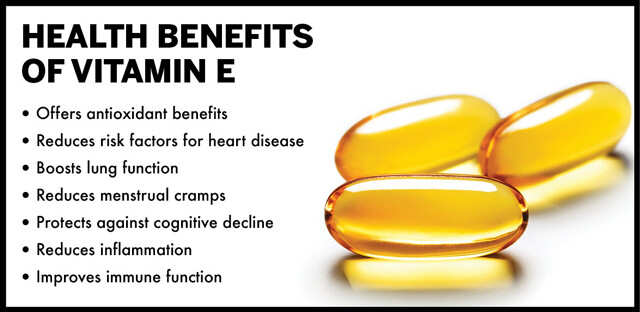Vitamin E is an essential nutrient that plays an important role in maintaining good health. It is a fat-soluble vitamin and acts as an antioxidant in the body, protecting cells from damage caused by free radicals. In this article, we will discuss the health benefits of vitamin E, its nutritional sources, and the recommended daily intake.
What is Vitamin E?
Vitamin E is a group of eight fat-soluble compounds that include four tocopherols and four tocotrienols. Alpha-tocopherol is the most biologically active form of vitamin E and is the form most commonly found in supplements and fortified foods. Vitamin E acts as an antioxidant, which means it helps to protect cells from damage caused by free radicals, which are produced by normal metabolism, exposure to pollutants, and other environmental factors.
Health Benefits of Vitamin E

Antioxidant Properties
One of the primary health benefits of vitamin E is its antioxidant properties. Antioxidants help to protect cells from damage caused by free radicals. Free radicals are unstable molecules that can damage cells and contribute to the development of chronic diseases such as heart disease, cancer, and Alzheimer’s disease.
Skin Health
Vitamin E also plays an important role in maintaining healthy skin. It helps to protect the skin from damage caused by UV radiation and other environmental factors. Vitamin E also helps to moisturize the skin and can help to reduce the appearance of fine lines and wrinkles.
Heart Health
Studies have shown that vitamin E may help to reduce the risk of heart disease. Vitamin E helps to prevent the oxidation of LDL cholesterol, which can lead to the formation of plaque in the arteries. Plaque buildup can lead to heart attack and stroke. Vitamin E may also help to reduce inflammation in the body, which is a risk factor for heart disease.
Eye Health
Vitamin E may also play a role in maintaining eye health. Studies have shown that vitamin E may help to reduce the risk of age-related macular degeneration, which is a leading cause of blindness in older adults.
Vitamin E Deficiency
Vitamin E deficiency is rare in healthy individuals, but it can occur in people with certain conditions such as cystic fibrosis and Crohn’s disease. Symptoms of vitamin E deficiency include muscle weakness, vision problems, and neurological problems.
Nutritional Sources of Vitamin E

Plant-based Sources
Some of the best plant-based sources of vitamin E include:
- Almonds
- Sunflower seeds
- Wheat germ
- Spinach
- Sweet potato
Animal-based Sources
Some of the best animal-based sources of vitamin E include:
- Salmon
- Trout
- Shrimp
- Cod
- Eggs
Daily Recommended Intake of Vitamin E
The recommended daily intake of vitamin E varies depending on age and gender. The recommended daily intake for adults is 15 milligrams (22.4 IU). Pregnant women and breastfeeding women may need higher amounts of vitamin E.
Vitamin E Supplements
:max_bytes(150000):strip_icc()/98370595-569feeac5f9b58eba4adfbbb.jpg)
While it is best to get your nutrients from whole foods, some people may benefit from taking vitamin E supplements. It is important to talk to your doctor before taking any supplements, as high doses of vitamin E can be harmful.
Precautions and Side Effects
Vitamin E is generally safe for most people when consumed in recommended amounts. However, taking high doses of vitamin E supplements can cause side effects such as stomach upset, diarrhea, and headaches. It can also increase the risk of bleeding in people taking blood-thinning medications.
Conclusion
Vitamin E is an essential nutrient that plays an important role in maintaining good health. It acts as an antioxidant, protecting cells from damage caused by free radicals. Vitamin E has several health benefits, including skin health, heart health, and eye health. It is important to consume a balanced diet that includes a variety of vitamin E-rich foods to meet the recommended daily intake.
FAQs
Can vitamin E supplements improve skin health?
- Studies have shown that vitamin E supplements may help to improve skin health by protecting the skin from UV damage and reducing the appearance of fine lines and wrinkles.
Can vitamin E prevent heart disease?
- Vitamin E may help to reduce the risk of heart disease by preventing the oxidation of LDL cholesterol and reducing inflammation in the body.
Is it safe to take vitamin E supplements?
- Taking vitamin E supplements in recommended amounts is generally safe for most people. However, high doses can cause side effects and increase the risk of bleeding in people taking blood-thinning medications.
What are the symptoms of vitamin E deficiency?
- Symptoms of vitamin E deficiency include muscle weakness, vision problems, and neurological problems.
What are the best food sources of vitamin E?
- Some of the best food sources of vitamin E include almonds, sunflower seeds, wheat germ, spinach, sweet potato, salmon, trout, shrimp, cod, and eggs.
Also read:


